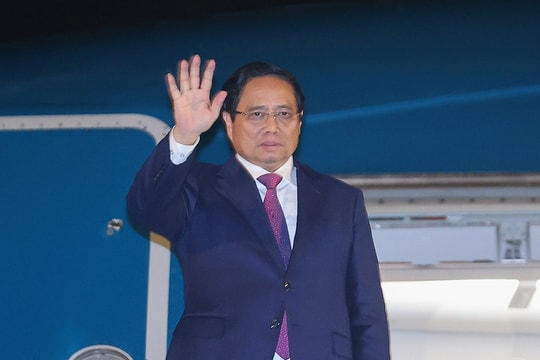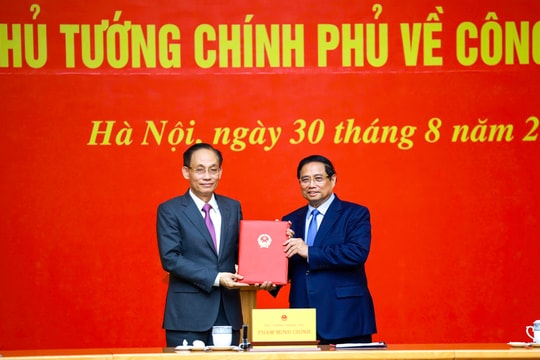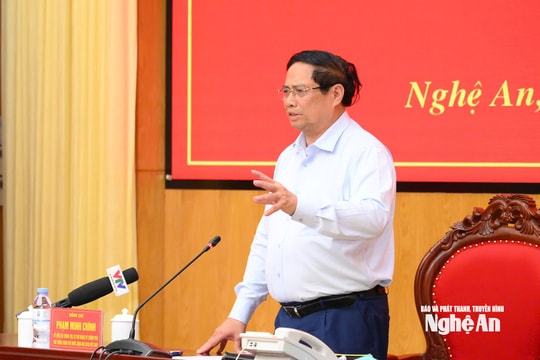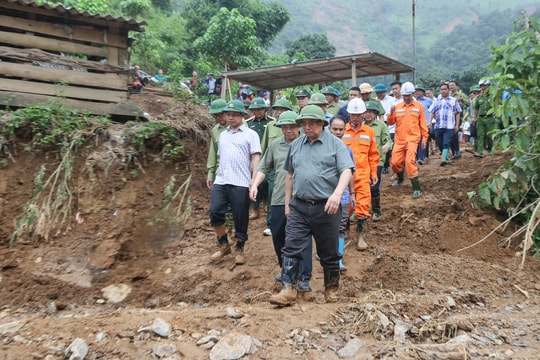Prime Minister Pham Minh Chinh works with the Policy Advisory Council
The Prime Minister said that the Government will continue to expand fiscal policy; implement proactive, flexible, appropriate, effective monetary policy, closely following reality in management.
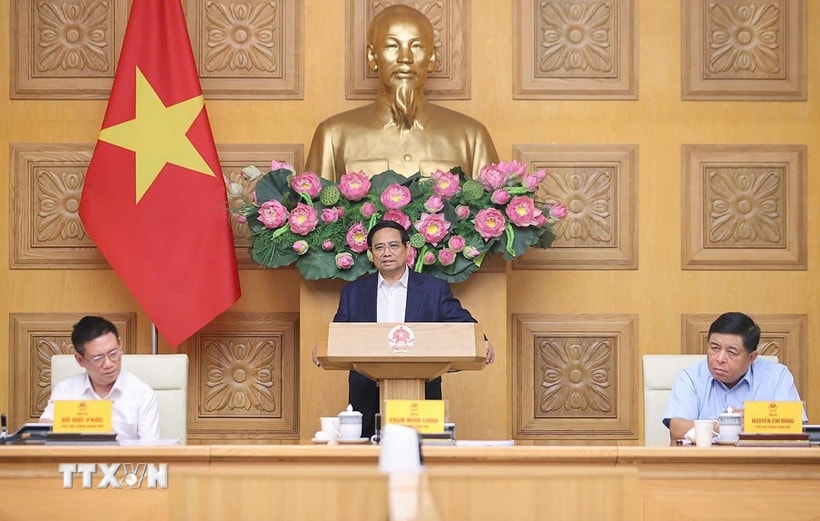
On the afternoon of September 7, Prime Minister Pham Minh Chinh worked with the Policy Advisory Council to discuss the issue of stabilizing the macro economy, stimulating consumption and operating two-level local governments. Attending the meeting were Deputy Prime Ministers Ho Duc Phoc and Nguyen Chi Dung; leaders of ministries and government agencies; and members of the Policy Advisory Council.
In his opening remarks, informing the Council about the international situation, especially the major economies and their impact on Vietnam, Prime Minister Pham Minh Chinh said that to achieve the two 100-year strategic goals, our country has been, is and will be implementing many important programs and strategies such as: Arranging administrative units, organizing two-level local governments; implementing "pillar" Resolutions.
Along with that, many projects that are transformational and change the situation such as high-speed railway, intermodal railway, nuclear power, International Financial Center, Free Trade Center are deployed. Social security policies are implemented to ensure that everyone has a place to live, students can study, and no one is left behind, such as: building 1 million social housing units; eliminating temporary and dilapidated houses; building schools in land border areas; exempting tuition fees, supporting lunch for students...
Emphasizing the task in 2025, striving to achieve the growth target of 8.3-8.5% and double digits in the following years, the Prime Minister said that this is an extremely heavy task, the Government needs and listens to comments on solutions, especially breakthrough solutions to achieve the set goals and the Policy Advisory Council is a quality channel.
At the meeting, members of the Policy Advisory Council discussed enthusiastically, analyzed the situation, made comments and proposed solutions to stabilize the macro-economy, stimulate consumption and operate the two-level local government effectively, efficiently and effectively.
Regarding the macro economy, members of the Policy Advisory Council commented that the macro economy is currently stable. However, some areas such as exchange rates, gold prices, stocks, and real estate require greater attention. The Council recommends steadfastly pursuing growth targets coupled with risk control, safety, inclusiveness, and sustainability, with utmost attention paid to growth quality and macroeconomic stability.
Regarding the issue of stimulating consumption, Council members said that growth drivers from both the supply and demand sides need to be renewed and effectively exploited, at least equivalent to or higher than the pre-COVID-19 pandemic level. Therefore, it is necessary to stimulate consumption with fiscal, monetary and other solutions.
Regarding the operation of two-level local government, the Council proposed to focus on building clear work processes; issuing training documents for commune and ward officials and documents guiding processes and procedures for people; researching and applying the inter-ward and inter-commune administrative model in some old urban areas to coordinate and ensure continuous provision of some essential services that were originally designed at the inter-ward and inter-commune scale.
The transfer of functions and tasks to wards and communes must be accompanied by the transfer of cadres who previously held that job at the district level. Speed up the progress of digital transformation, including data connection; unify a common platform for handling interconnected public services; focus on adjusting planning to have a basis for implementing other tasks; have plans to overcome the overload in handling work at the commune level...
The Council also pointed out that household businesses are an indispensable pillar of the economy, contributing nearly 25% of GDP, creating jobs for millions of workers, bringing flexibility and dynamism to the economy, meeting local consumption needs, and helping to preserve traditional cultural values.
Therefore, any change towards this area requires caution, patience, perseverance, and step-by-step approach, starting with raising awareness, followed by substantial and effective support in both physical facilities and processes, with the ultimate goal of achieving people's satisfaction and voluntary compliance...
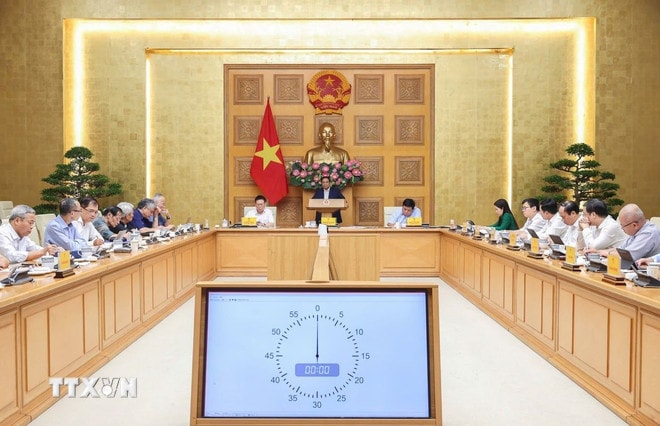
Concluding the meeting, Prime Minister Pham Minh Chinh acknowledged and highly appreciated the profound, dedicated, responsible, sincere and straightforward opinions, along with the scientific and practical thinking and approach to solving problems of the members of the Policy Advisory Council.
The Prime Minister agreed with the Council's comments on the impact of the US tariff policy on the world and Vietnam, as well as proposed safe and flexible adaptation solutions such as: strengthening relations with the US; diversifying markets, diversifying products, diversifying supply chains; restructuring export markets; encouraging overseas investment; having solutions to retain investors, encourage investment in technology, technology transfer, creating conditions for Vietnamese enterprises to participate in their supply chains.
Appreciating the Council's opinions on real estate and requesting the Council to study the real estate issue more comprehensively, the Prime Minister said that real estate is a driving force for growth, however, there are currently some signs that are not as expected, requiring comprehensive solutions on supply and demand, finance, land, etc. for real estate to develop sustainably. In particular, the Government is actively handling legal issues, preferential policies, cutting administrative procedures, promoting the supply of social housing, contributing to the clearance of high-end real estate, and controlling real estate inventory.
Agreeing with the opinions of scientists and economists on solutions for high and sustainable growth, the Prime Minister said that the Government will continue to expand fiscal policy; implement proactive, flexible, appropriate, effective monetary policy, closely following reality in management.
The Prime Minister also agreed to promote the application of science and technology, innovation, digital transformation, increase labor productivity, stimulate production and business, create jobs and livelihoods for people; diversify credit sources, increase 20-25% of bond sources focusing on large projects and works.
Regarding the balance between interest rates and exchange rates, according to the Prime Minister, the most difficult thing is the exchange rate, especially when the USD increases in value; we expect that if the value of the USD decreases due to lower interest rates, it will be a good thing, but we must have proactive solutions to prevent it; promote public investment, and be determined to disburse 100% of public investment capital.
Regarding the gold market, the Prime Minister agreed with the opinions of experts on the need to prevent speculation, hoarding, and creating a mentality of scarcity; fight against smuggling; increase gold supply to the market...; and assigned the State Bank to absorb opinions and have solutions to implement immediately, but not to allow policy abuse through inspection and supervision tools.
Note that we must be proactive, calm, courageous, and solve problems, not panic or waver in the face of bad, sudden, and unexpected developments; but we must also not be negligent or lose vigilance in the face of any problem. Prime Minister Pham Minh Chinh said that it is necessary to keep the interest rate of the Vietnamese currency stable; increase the export of goods to have a trade surplus; export logistics and tourism services; control smuggling, and prevent speculation in gold and USD.
Along with that, it is necessary to stimulate consumption, promote domestic production and business, reduce input costs, increase the competitiveness of goods; organize fairs to enhance the exchange of goods, connect supply and demand; have tax policies more suitable to the situation in Vietnam; reduce taxes, fees, charges...
Regarding the organization and operation of the two-level local government, the Prime Minister acknowledged the opinions of the Council; said that the work at the commune level is under pressure and needs to be relieved. Therefore, it is necessary to enhance the capacity of officials; promote digital transformation, especially in handling administrative procedures; arrange and assign officials to suit the work and capacity of officials; and change the state from management to creation and service.
The Prime Minister said that it is necessary to continue providing professional training for officials; to implement decentralization and delegation of power along with resource allocation; to strengthen inspection, supervision and evaluation; to enhance comprehensive capacity for commune-level public administration centers; to properly handle the arrangement of facilities; to have policies and mechanisms for officials; to promote innovation, creativity and digital transformation, including digital transformation in terms of institutions, infrastructure and human resources; and to well organize the "digital literacy" movement.
Acknowledging the opinions of the Council on State-owned enterprise shares, focusing on reviewing enterprises that are producing and doing business inefficiently and continuing to promote enterprises that are operating effectively, the Prime Minister also agreed with the Council's opinions on promoting public-private cooperation; digitalizing operations, especially in the banking system, especially building a project on digitalization to serve the leadership and operations of the Government, the Prime Minister, and Deputy Prime Ministers in the spirit of "harmonized benefits, shared risks; having policies to promote business households to develop in a healthy direction"./.

